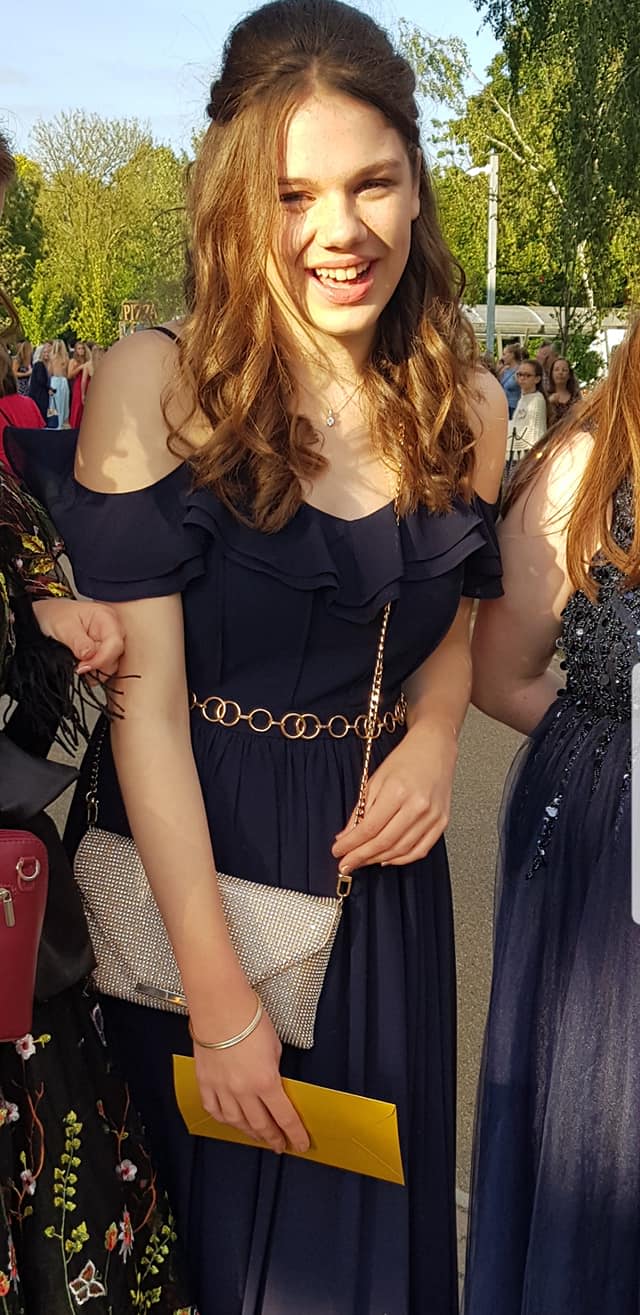My life with hidden disabilities
Olina, 17, from Cambridge Children's Press Pack, tells her story.

My name is Olina. I am 17 years old. I am currently studying for a Media Studies diploma and hope to apply to an arts university this autumn. I also have two chronic illnesses.

In Year 5, the week before February half term, I became ill, with a low-grade temperature. I rested for a few days, but with plans to go on a camp that weekend, my mum took me to the GP. He said it was a virus and as long as my temperature went down, I would be fine. He also ‘prescribed’ me ice cream and to sing all the songs from Frozen, daily!

Olina, age 9, soon after her CFS diagnosis, with author Jacqueline Wilson and her sister, Bethany
Olina, age 9, soon after her CFS diagnosis, with author Jacqueline Wilson and her sister, Bethany
I never recovered properly. If I felt better and went back to school, the next day I would have a temperature again and would feel very ill. This continued for 6 weeks. I returned many times to the GP, who said it was post viral. They did some blood tests to see if it was glandular fever, but it wasn’t. I was then sent to the rapid referral clinic at Addenbrooke’s hospital. They thought it was Chronic Fatigue Syndrome (CFS) but did more tests to rule out Lupus and Coeliac Disease. A CFS specialist officially diagnosed me that summer. Fortunately, getting my diagnosis was quick but for some people it can take years.
The PoTS symptoms developed a few years later. It was much harder to get a diagnosis for this. We read about a ‘sit-stand’ test you can do at home to see if your symptoms match with those of PoTS. Mine did. I was diagnosed at Great Ormond Street when I was 13.

Olina, in her wheelchair, age 13
Olina, in her wheelchair, age 13
I am glad I got the PoTS diagnosis as it allowed me to be seen by the right doctor who understood my condition and knew exactly how to treat it. He has prescribed me the right medication, which won’t make me “better”, but instead manages my symptoms. I take it every morning and every night, which allows me to do everyday things, like going to college and see my friends. If I don’t take this medication, I feel extremely ill, and I can’t do those ‘normal’ things.
ME/CFS is an illness affecting many different parts of the body, and which can last for a long time in some people. Symptoms include intense fatigue and feeling unwell, which isn't made better by rest; pain in the muscles or joints; stomach problems; difficulty sleeping; and memory and concentration problems. Symptoms vary in severity between different people. Even mild physical exertion can trigger fatigue in those with ME/CFS. Around a quarter of a million people in the UK have ME/CFS. Find out more at meresearch.org.uk
Postural Tachycardia Syndrome (PoTS) is an abnormality of the functioning of the autonomic (involuntary) nervous system. For people with PoTS, standing up leads to an excessive rise in heart rate, increased norepinephrine in the blood and altered blood flow to the brain. Norepinephrine is part of your sympathetic nervous system, which is part of your body’s “fight-or-flight” response. Symptoms might include dizziness, anxiety, stomach problems and passing out. Find out more at www.potsuk.org
Living day to day with hidden disability
It can be very frustrating having a long-term illness, especially at the start when you don’t know your limit of what you can do without feeling ill. Seeing my friends doing everything that I couldn’t do was very frustrating. Even now that I am much better than I was a few years ago, it is still difficult. Particularly, when I am having a bad day and can’t do what I normally can.
In some cases of PoTS, the condition improves over time until it is almost completely gone, but mostly symptoms are managed by lifestyle changes, medication, and learning individual limits. Over the last five years, I have learnt my limits. This means I generally feel good most days as I don’t push myself often. My condition has noticeably improved over the last two years. With help, I can consistently do more than I have been able to do since I became ill seven years ago.
The education system recognises my condition and provides support which means I go to college part time and get transport, so I don’t have to use lots of energy on public transport. I go horse riding with my local Riding for the Disabled Association. I go to my youth groups, church, and gospel choir. Everyone there knows about my illnesses and therefore they understand when I can’t do as much as everybody else. This may sound like I do a lot of things in one week but most of my time in between is spent resting.
I also have disability aids which help me with everyday things, such as a shower stool and a wheelchair. This means I can sit and rest when I need to.
Mental health
I think many people with hidden disabilities face mental health challenges. Personally, I struggled with low mental health when I was in stages of bad physical health. I was almost housebound, and I wasn’t seeing much of people my age. While recovering from the worst stage of my illness, I had a fear of missing out. I wanted to go everywhere and do everything with my family, but I would do too much and exhaust myself.
Due to a lack of understanding, I have had people say that I’m lucky because I didn’t have to do homework or come into school every day. But I love school and would often be very upset that I couldn’t go and do the things that my peers were doing. A lot of my school friends didn’t know what it was like to have a chronic illness and therefore didn’t understand how hard it was. This is why spreading awareness is so important.
I like to take the opportunity to explain my illnesses to those who don’t know about them, but having to explain the same thing over and over can be hard. I have many symptoms and they impact my life in multiple ways so listing them can feel like a chore. When I first got ill, no one I spoke to knew about CFS, but these days I often get a surprise when people respond with “I know what that is!" It’s great to see that awareness is growing.
Awareness within the medical profession
I think it’s vital that doctors and medical staff have awareness and knowledge of chronic illness and hidden disabilities. I have been very fortunate in that I was diagnosed reasonably fast compared to a lot of people. The doctors I have interacted with have almost always been understanding and willing to learn about my illnesses. Not everyone is so lucky. I know of people who, sadly, haven’t been listened to, been misdiagnosed, and received the wrong treatment. Most of this is because a lot of chronic illnesses aren’t well known. Raising awareness and understanding will help ensure quicker and correct diagnosis, so people don’t go through months, even years, with no treatment and medication.




Creating a better experience at Cambridge Children's Hospital
There are many things that would help people with chronic and invisible illnesses at Cambridge Children’s Hospital, such as places to sit in long corridors or lifts, or any areas where standing or walking is necessary. Staff shouldn't question or make judgement when a child or young person says they need to sit down or use a wheelchair. Some people wear a badge, pin or sunflower lanyard to tell others they have a hidden condition. But I don't think you should have to wear one of these and there should be an understanding of invisible illnesses anyway. I think it’s important that all hospital staff believe all patients, regardless of how they look.
In some families, more than one child can have a long-term condition. This is the case in my family. Both of my siblings, Bethany, 18, and Zeke, 9, also have chronic illnesses. This does mean we understand what each of us is going through, but it also has a larger impact on the wider family because we all have different specialists, appointments and medications.
Having a hospital that cares not just for the sick child, but for the whole family, is so important. The impact of chronic long-term conditions is huge, and everyone connected to the child needs support. So, having a hospital that cares for us all in one place and understands how this impacts us and our parents would be very beneficial.

Zeke, Bethany, mum Michelle, Olina and dad Chris
Zeke, Bethany, mum Michelle, Olina and dad Chris
Thank you Olina for sharing your story


